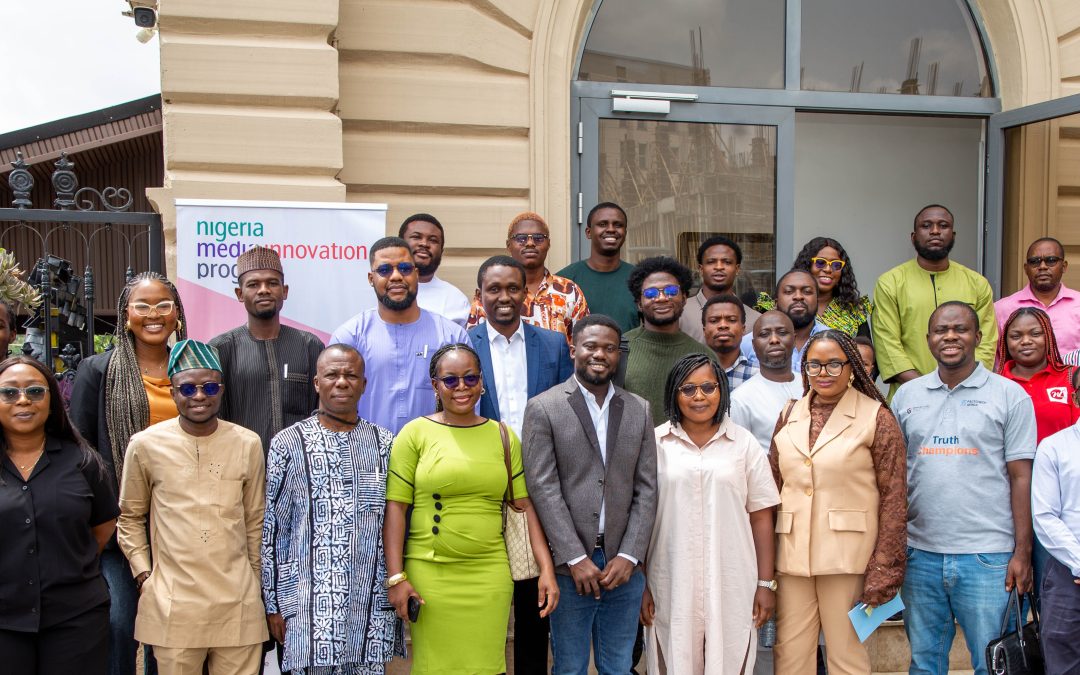Abuja, Nigeria — May 26, 2025
The Nigeria Media Innovation Program (NAMIP) recently held an extensive five-day Media Business Bootcamp from May 19-23, 2025. This bootcamp was designed to address and bridge the critical ideological gaps that hinder the development of strong media products and businesses within the Nigerian media landscape. The workshop successfully hosted 19 participants from 16 selected media organizations, aiming to equip early-stage and emerging media entrepreneurs with essential knowledge, innovative tools, and expert mentorship. The goal was to help them create media ventures that are not only viable but also audience-focused and financially sustainable.
The bootcamp showcased an array of facilitators, each bringing a wealth of experience and specialized knowledge in their respective fields related to media and entrepreneurship. The workshop kicked off with a keynote address by Deji Adekunle, the NAMIP Program Director by guiding participants through the historical context and evolving landscape of the Nigerian media ecosystem. His keynote also addressed the important role Media Development Investment Funds (MDIF) play in supporting independent media organizations in countries where access to reliable news is constantly under threat.
Following this, Dara Ajala, the NAMIP Program Manager, took the stage to lead a reflective panel discussion with facilitators centered on the concepts of legacy, innovation, and sustainability in Nigerian media. Engaging the participants in critical dialogue, she drew attention to the need for media organizations to adapt and evolve while maintaining their foundational values. This discussion set the tone for the importance of resilience and adaptability in the ever-changing media landscape.
Anita Eboigbe conducted a session on Framing Media Entrepreneurship, where she intricately unpacked the various dimensions of media startups. Her workshop focused on identifying and addressing the unique challenges that new media organizations often encounter, helping participants to diagnose common pitfalls and develop proactive strategies to overcome them. Eboigbe’s practical approach provided valuable insights for aspiring media entrepreneurs.
Next, Oluwaseun Adebowale from MacAdebowale Advisory (MAPS Advisory) took the stage, delivering a comprehensive presentation on Financial Planning for Media Startups. He stressed the critical nature of sound financial management, especially in the formative stages of a business. Adebowale elaborated on essential topics such as budgeting, forecasting, cost modeling, and strategic pricing. He shared actionable tips on improving financial oversight, which are vital for maintaining operational viability and achieving long-term sustainability.
In an equally important session, Emmanuel Effiong from ACIOE Associates addressed the critical aspect of Legal Structures for media businesses. He equipped attendees with an understanding of the legal frameworks necessary for operating within Nigeria’s regulatory environment. Effiong’s guidance ensured that participants were aware of the legal considerations that could impact their ventures, thereby fostering informed decision-making.
Fu’ad Lawal presented an in-depth workshop on Product Strategy, Execution, and Organizational Leadership. His session was designed to empower participants with practical strategies for aligning product development with both organizational objectives and market needs. By utilizing case studies from successful organizations, Lawal encouraged attendees to refine their approaches to product development and to enhance their leadership capabilities within product teams, thereby maximizing their effectiveness in a competitive landscape.
Finally, Victor Olatunde from Salesplat rounded out the bootcamp with a focus on Market Strategy, Sales Design, and Revenue Modeling. He shared effective methodologies for establishing sustainable revenue streams, particularly in the fast-paced media environment. Olatunde guided participants through the crucial elements of Go-To-Market (GTM) strategies, revenue model design, and effective sales techniques, all aimed at empowering them to thrive amidst stiff competition.
Overall, the bootcamp provided an array of learning experiences that equipped participants with the knowledge and tools necessary to navigate and succeed in the evolving media industry in Nigeria. Through interactive sessions, practical exercises, and one-on-one mentorship opportunities, the bootcamp enabled participants to refine their ideas and business models, ultimately fostering a community of informed and prepared media entrepreneurs ready to make their mark in the Nigerian media industry.
For a comprehensive summary of lessons learned during the workshop, visit NAMIP’s learning website.

